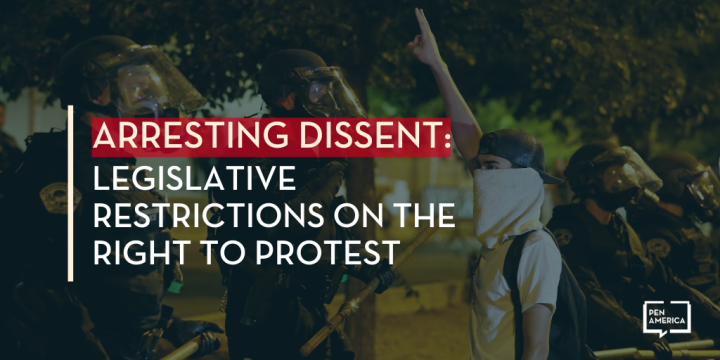
Basic democratic rights have increasingly come under siege since the 2016 election, and not just at the federal level. In this report, Arresting Dissent: Legislative Restrictions on the Right to Protest, PEN America shines a spotlight on the proliferation of state-level legislative proposals seeking to limit protest rights.
PEN America has documented an explosion of 116 state bills introduced since 2015—110 of which were introduced between 2017 and 2019 alone—that create new penalties or harsher sentences for protesters. In many cases, these bills appear to be direct responses to particular protests, or designed to constrain particular protest movements. These include “critical infrastructure” bills introduced in states that have seen significant pipeline protests, and anti-highway obstruction bills following on the heels of protests that have used road obstruction as a tactic.
Legislators sometimes state openly that they are introducing legislation with specific protests or protest movements in mind. At the same time, the president expresses hostility toward certain protest movements, and support for others, depending on whether or not they align with his views. This kind of selective interpretation of the First Amendment makes all too clear the political motivations that have colored legislative efforts, and has created fertile ground for a pattern of efforts to restrict protest rights.
Of the 116 bills introduced since 2015 that would limit protest rights, 23 bills in 15 states have become law, and only two of those have been challenged in court. Already in the 2020 session, PEN America notes 16 similar bills working their way through state capitols. These new laws place a heavy burden on individuals in states where these bills have passed, forcing them to weigh their civic interest in exercising their First Amendment rights against the very real potential of being arrested or facing other reprisals.
REVIEW THE INDEX OF ALL 116 PROPOSALS »
KEY CONCLUSIONS
- Since the November 2016 presidential election, there has been an explosive increase in the number of state-level bills, both proposed and enacted, that criminalize or heighten penalties for protest-related activities—activities that either arise naturally from a protest or are likely to occur as a foreseeable part of protest.
- Prior to 2017, the number of similar proposals introduced across the country was extremely limited: Between 2015 and 2016 together, state legislators introduced only six proposals that restricted protest rights. In 2017, this number shot up to 56. In 2018, the number of such bills was 17. In 2019, an additional 37 bills were proposed.
- Out of a total of 116 bills proposed since the beginning of 2015, 23 have become law across 15 states. Nearly a third of all states have implemented new regulations on protest-related activity in the past five years. Starting in 2017, PEN America has found, passage rates for such bills are approximately 20 percent.
- Two influential think-tanks—the American Legislative Exchange Council and the Council of State Governments—have promoted model or example legislation that has provided a template for many of these bills, with state-level legislators often borrowing heavily from them.
- As a general trend, there is a clear and identifiable link between the increase in these legislative proposals and the rise of broad-based protest movements in the relevant states. Legislators sometimes make it explicitly clear that their bills have been proposed with specific protests in mind. Commonly, a state’s ‘anti-protest’ bills have sought to regulate the very type of protest activity that occurred in the months or years prior.
EXPERT CONTACTS
Nora Benavidez
Director, U.S. Free Expression Programs
Contact »
James Tager
Deputy Director, Free Expression Research and Policy
Contact »





